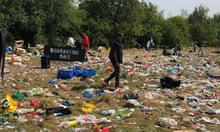England will experience a “summer of rave” not seen since 1989 because the government has failed to give “socially starved” young people any clarity on when they can start partying again legally, clubbing experts have warned.
Police forces across England have been struggling to keep up with a rising number of illicit parties in motorway underpasses, parks and industrial estates since Boris Johnson relaxed lockdown restrictions last month.
Advertised on Snapchat and Instagram, their locations are revealed at the 11th hour by WhatsApp messages, with word quickly spreading as people livestream the event on social media, dropping virtual “pins” on Google Maps for their friends to join them.
Most proceed peacefully, if in contravention of physical distancing guidelines. But thousands of people attended two raves in Greater Manchester at the weekend, leaving one man dead of a suspected drugs overdose, one woman reporting a rape, and three separate reported stabbings.
The organisers of one of the parties – in Carrington, Trafford, where the stabbings and the alleged rape occurred – were charging £30 for wristbands to enter on Saturday night and attracted 2,000 revellers from as far away as Birmingham, a 90-mile drive, according to a local councillor.
Mike Kill, the chief executive of the Night Time Industries Association, said it was clearly not a spontaneous gathering but had required “quite a bit of infrastructure”. He said firms that rented stages, generators and sound systems to the illegal raves should be “blacklisted” by the events industry, “because that’s just not the way to do business”.
The other Greater Manchester rave, in which Daisy Nook country park in Oldham was overrun by about 4,000 people, was less sophisticated, according to James Morsh, a club promoter from Nottingham who last month organised what was reported to be the first physically distanced rave in a forest in Nottingham.
He saw people posting videos live from the party on Saturday night: “The set-up was very, very basic. They must have been a few lads, inviting a few hundred people down and then, boom, it’s on Snapchat, everyone’s like, ‘Where is it? Oh, Daisy Nook’. Boom, everyone goes there. That’s how these things spread.”
Sean Fielding, the leader of Oldham council, said he first heard about the Daisy Nook rave at about 6.30pm on Saturday. “There was intelligence we’d picked up that there would be a large gathering on Daisy Nook. Then I got an email saying the police were heading down to turn people away, but by the time the police got there, there were so many young people there for the rave that it just became an exercise in trying to manage it,” he said.
His counterpart in Trafford, Andrew Western, said the location for the Carrington rave, on private land near Manchester United’s training ground, was only sent out an hour in advance, at 6pm. “There had been a certain amount of set-up on Facebook and social media beforehand, but there was no confirmation of the location until an hour before.”
Adele New, a local councillor, said residents were furious. “We knew nothing of it until people started pouring into Carrington on the evening it took place. My residents are extremely annoyed that this took place here during the pandemic and also that again our community is being seen in a bad light in the media. People came from Liverpool, Blackburn, Birmingham and Salford to attend, paying as much as £30 per wristband.”
This is only the start of a summer of rave, warned Morsh, who is setting up a social enterprise called the Pill Report, where people can safely review drugs. “You know the summer of 89? I think this is a new revolution on the scale of that … All the clubs are shut, everyone is at home, people have been cooped up at home for three months. As soon as they catch wind of anything, on Snapchat, Instagram stories or whatever, they’re like, ‘Where’s that? WhatsApp me the pin’.”
Kill agrees. “The youth of today want to be out and want to be engaged. There are a lot of people out there who are socially starved at the moment. And that’s why these illegal raves are starting to pop up because [people] have been trapped inside four walls for a long time now … I don’t think there is anyone in our industry who couldn’t see this coming.”
The government needs to make clear the timeline for nightlife reopening, said Kill. “Without very clear timelines there’s a lot of people looking at creating their own opportunities, socially, and putting on raves – almost like the 80s in some respects.”
In Whittington, near Lichfield, Staffordshire police broke up a party of 1,000 people near Brookhay Lane in the early hours of Sunday morning, charging an 18-year-old with assaulting a police officer by spitting, and being drunk and disorderly.
In Leeds, a section of the M1 was closed on Saturday night after West Yorkshire police shut down an illegal rave held in an underpass at junction 45. Up to 600 people were dispersed, with some fleeing via the motorway slipway, police said.
In Hackney, east London, the council last week won an interim injunction to stop raves on Hackney Marshes, known as the spiritual home of Sunday league football with its 82 football, rugby and cricket pitches. The council said it applied for the injunction anticipating a summer of raves – last year there were 20 parties over different weekends, and during the lockdown there has already been two sound systems set up on the Marshes, attended by about 300 people, a spokesman said.
In Wales and Scotland, where the devolved administrations have been more cautious about easing lockdown restrictions, raves have not yet posed a problem, police said.







